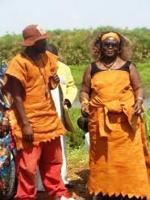How to Make Tanzania Ugali Recipe
May be you've eve tasted Tanzania Ugali Recipe. On this page we will show you how to make Sima recipe for your family.
Ugali is an East African dish (also sometimes called sima, sembe, or posho) of maize flour (cornmeal) cooked with water to a porridge- or dough-like consistency.
It is the most common staple starch of much of Eastern and Southern Africa.
When ugali is made from another starch, it is usually given a specific regional name.
How to Make Sima/ Ugali/ Posho Dishes
The traditional method of eating ugali (and the most common in the rural areas) is to roll a lump into a ball, and then dip it into a sauce or stew of vegetables and/or meat.
Making a depression with the thumb allows the ugali to be used to scoop, and to wrap around pieces of meat to pick them up in the same way that flat bread is used in other cultures.
Ugali is relatively inexpensive and is thus easily accessible to the poor who usually combine it with a vegetable stew (e.g. sukuma wiki in Kenya) or meat stews and makes a filling meal.
Ugali is easy to make and the flour can last for considerable time in average conditions. Maize from which the flour is obtained is hardy and will grow reliably in dry seasons.
For these reasons, ugali is an important part ofthe diet of millions of people of Sub Saharan Africa.
Ingredients to make Tanzania Ugali Recipe
•1 cup water
•1 tsp. salt
•1 cup milk
•1 cup white cornmeal
8.Keep cooking and stirring until the ugali is very stiff and thick and pulls away from the sides of the saucepan.
Directions to make Tanzania Ugali Recipe<1.Boil the water with the salt added in a saucepan.
2.In a separate bowl, stir the milk into the white cornmeal.
3.Keep stirring until it is smooth.
4.Then slowly pour the cornmeal mixture into the boiling saltedwater.
5.Stir this mixture constantly for a couple of minutes until it starts to thicken.
6.Turn the heat on the stove to low and continue to cook the ugali for about 10 - 15 minutes.
7.Stir it every couple of minutes.
Recent Articles
-
Garam Masala Appetizers ,How to Make Garam Masala,Kenya Cuisines
Sep 21, 14 03:38 PM
Garam Masala Appetizers are originally Indian food but of recent, many Kenyans use it. Therefore, on this site, we will guide you on how to make it easily. -
The Details of the Baruuli-Banyara People and their Culture in Uganda
Sep 03, 14 12:32 AM
The Baruuli-Banyala are a people of Central Uganda who generally live near the Nile River-Lake Kyoga basin. -
Guide to Nubi People and their Culture in Kenya and Uganda
Sep 03, 14 12:24 AM
The Nubians consist of seven non-Arab Muslim tribes which originated in the Nubia region, an area between Aswan in southern







New! Comments
Have your say about what you just read! Leave me a comment in the box below.